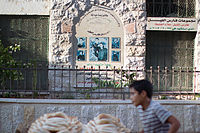- Martyr
-
For other uses, see Martyr (disambiguation).
A martyr (Greek: μάρτυς, mártys, "witness"; stem μάρτυρ-, mártyr-) is somebody who suffers persecution and death for refusing to renounce, or accept, a belief or cause, usually religious.
Contents
Meaning
In its original meaning, the word martyr, meaning witness, was used in the secular sphere as well as in the New Testament of the Bible.[1] The process of bearing witness was not intended to lead to the death of the witness, although it is known from ancient writers (e.g. Josephus) and from the New Testament that witnesses often died for their testimonies.
During the early Christian centuries, the term acquired the extended meaning of a believer who is called to witness for their religious belief, and on account of this witness, endures suffering and/or death. The term, in this later sense, entered the English language as a loanword. The death of a martyr or the value attributed to it is called martyrdom.
The early Christians who first began to use the term martyr in its new sense saw Jesus as the first and greatest martyr, on account of his crucifixion.[2][3][4] The early Christians appear to have seen Jesus as the archetypical martyr.[5]
The word martyr is used in English to describe a wide variety of people. However, the following table presents a general outline of common features present in stereotypical martyrdoms.
Common features of stereotypical martyrdoms[6] 1. A hero A person of some renown who is devoted to a cause believed to be admirable. 2. Opposition People who oppose that cause. 3. Foreseeable risk The hero foresees action by opponents to harm him or her, because of his or her commitment to the cause. 4. Courage and Commitment The hero continues, despite knowing the risk, out of commitment to the cause. 5. Death The opponents kill the hero because of his or her commitment to the cause. 6. Audience response The hero’s death is commemorated. People may label the hero explicitly as a martyr. Other people may in turn be inspired to pursue the same cause. Judaism
Main article: Martyrdom in JudaismMartyrdom in Judaism is one of the main examples of Kiddush Hashem, meaning "sanctification of God's name" through public dedication to Jewish practice. Religious martyrdom is considered one of the more significant contributions of Hellenistic Judaism to Western Civilization. 1 Maccabees and 2 Maccabees recount numerous martyrdoms suffered by Jews resisting Hellenizing (adoption of Greek ideas or customs of a Hellenistic civilization) by their Seleucid overlords, being executed for such crimes as observing the Sabbath, circumcising their boys or refusing to eat pork or meat sacrificed to foreign gods. According to W. H. C. Frend: “Judaism was itself a religion of martyrdom” and it was this “Jewish psychology of martyrdom” that inspired Christian martyrdom.
Christianity
Main article: Christian martyrsIn Christianity, a martyr, in accordance with the meaning of the original Greek martys in the New Testament, is one who brings a testimony, usually written or verbal. In particular, the testimony is that of the Christian Gospel, or more generally, the Word of God. A Christian witness is a biblical witness whether or not death follows.[7] However over time many Christian testimonies were rejected, and the witnesses put to death, and the word martyr developed its present sense. Where death ensues, the witnesses follow the example of Jesus in offering up their lives for truth.
The concept of Jesus as a martyr has recently received greater attention. Analyses of the Gospel passion narratives have led many scholars to conclude that they are martyrdom accounts in terms of genre and style.[8][9][10] Several scholars have also concluded that Paul the Apostle understood Jesus' death as a martyrdom.[11][12][13][14][15][16] In light of such conclusions, some have argued that the Christians of the first few centuries would have interpreted the crucifixion of Jesus as a martyrdom.[5][17]
In the context of church history, from the time of the persecution of early Christians in the Roman Empire, it developed that a martyr was one who was killed for maintaining a religious belief, knowing that this will almost certainly result in imminent death (though without intentionally seeking death). This definition of martyr is not specifically restricted to the Christian faith. The first Christian witness to be killed for his testimony was Saint Stephen (whose name means "crown"), and those who suffer martyrdom are said to have been "crowned."
Some Christians view death in sectarian persecution, as well as religious persecution, as martyrdom. In Christian history, Foxe's Book of Martyrs recounts religious persecutions during the Protestant Reformation. Yet even more modern day accounts of martyrdom for Christ exist, shown in books such as Jesus Freaks.
Islam
 A modern image of a 'martyr' taken in Nablus
A modern image of a 'martyr' taken in Nablus Main article: Shahid
Main article: ShahidIn Arabic, a martyr is termed shahid, شهيد not شاهد. Shaheed appears in the Quran in a variety of contexts, including witnessing to righteousness (Quran 2:143), witnessing a financial transaction (Quran 2:282) and being killed, even in an accident as long as it doesn't happen with the intention to commit a sin, when they are believed to remain alive making them witnesses over worldly events without taking part in them anymore (Quran 3:140). The word also appears with these various meanings in the hadith, the sayings of Muhammad.
Hinduism
Despite the promotion of ahimsa (non-violence) within Santana Dharma, there is also the concept of righteous (dharma), where violence is used as a last resort after all other means have failed. Examples of this include in the Mahabharata. Upon completion of their exile, the Pandavas were refused the return of their portion of the kingdom by their cousin Duruyodhana; and following which all means of peace talks by Krishna, Vidura and Sanjaya failed.
During the great war which commenced, even Arjuna was brought down with doubts e.g. attachment, sorrow, fear. This is where Krishna instructs Arjuna how to carry out his duty as a righteous warrior and fight.
Martyrdom in war or battle is seen as highly noble in Hinduism, i.e. in the ancient times the teachings were that if a man were to die the death of a Kshatriya on the battlefield he would attain moksha (emancipation of the soul), which is evident in the Bhagavad Gita where Krishna states, "Either being slain you will attain the heavenly worlds or by gaining victory you will enjoy the earthly kingdom; therefore O Arjuna, rise up and fight.".[18]
Bahá'í faith
Main article: Martyrdom in the Bahá'í FaithIn the Bahá'í Faith, a martyr is one who sacrifices their life serving humanity in the name of God.[19] However, Bahá'u'lláh, the founder of the Bahá'í Faith, discouraged the literal meaning of sacrificing one's life, and instead explained that martyrdom is devoting oneself to service to humanity.[19]
Sikhism
Main article: Martyrdom in SikhismMartyrdom (called shaheed in Punjabi) is a fundamental concept in Sikhism and represents an important institution of the faith. The Sikh Gurus and Sikh with and after them are the biggest examples of martyrs. They fought against Mughal tyranny and opperesion hence upholding the fundamentals of Sikhism. And in which their lives were taken. During protesting non-violently or in battles.
Bhagat Singh is usually interpreted in India as a Sikh martyr. Though there were many silent acts of martyrdom during the independence struggle of India against the British. It is usually considered that though being under 2% of India's population, Sikh contribution to Independence struggle against only British was more than 70% of the total figures. For instance, of 120+ people hanged, 90+ were Sikhs, out of 2200+ sent to life imprisonment 1900+ were Sikhs.
A larger contribution had come during the 18th century against Mughals and Afghans.
Chinese culture
Main article: Martyrdom in Chinese cultureMartyrdom was extensively promoted by the Tongmenghui and the Kuomintang party in modern China, revolutionaries who died fighting against the Qing dynasty in the Xinhai Revolution and throughout the Republic of China period, furthering the cause of the revolution, were recognized as martyrs.
Some historic famous martyrs
 From the Gallery of 20th Century Martyrs at Westminster Abbey—l. to r. Mother Elizabeth of Russia, Rev. Martin Luther King, Archbishop Oscar Romero and Pastor Dietrich Bonhoeffer
From the Gallery of 20th Century Martyrs at Westminster Abbey—l. to r. Mother Elizabeth of Russia, Rev. Martin Luther King, Archbishop Oscar Romero and Pastor Dietrich Bonhoeffer
- Hussein ibn Ali, Son of Ali, Battle Of Karbala
- Jesus, Son of Mary, and incarnated Son of God of the Christian faith
- Socrates, ancient Greek philosopher
- Ten Martyrs of Judaism
- Guru Arjan Dev, the 5th leader of Sikhism, martyred 30 May 1606.
- Fr Maximilian Kolbe, OFM, a Roman Catholic priest, who was martyred in the Nazi concentration camp at Auschwitz, August 1941.
- Archbishop Paulos Faraj Rahho, Chaldean prelate, who was martyred in Iraq, March 2008.
See also
A communist "martyrs column" in Alappuzha, Kerala, India
- Martyr complex
- Martyrology
- Perpetua and Felicity
- Religious persecution
- Religious views on suicide
References
- ^ See e.g. Alison A. Trites, The New Testament Concept of Witness, ISBN 0-521-60934-8 and ISBN 9780521609340.
- ^ Frances M. Young, The Use of Sacrificial Ideas in Greek Christian Writers from the New Testament to John Chrysostom (Eugene, OR: Wipf & Stock, 2004), pp. 107.
- ^ Eusebius wrote of the early Christians: "They were so eager to imitate Christ ... they gladly yielded the title of martyr to Christ, the true Martyr and Firstborn from the dead." Eusebius, Church History 5.1.2.
- ^ Scholars believe that Revelation was written during the period when the word for witness was gaining its meaning of martyr. Revelation describes several Christian martyrdoms with the term martyr (Rev 17:6, 12:11, 2:10-13), and describes Jesus in the same way ("Jesus Christ, the faithful witness/martyr" in Rev 1:5, and see also Rev 3:14).
- ^ a b A. J. Wallace and R. D. Rusk, Moral Transformation: The Original Christian Paradigm of Salvation (New Zealand: Bridgehead, 2011), pp. 217-229.
- ^ From A. J. Wallace and R. D. Rusk, Moral Transformation: The Original Christian Paradigm of Salvation (New Zealand: Bridgehead, 2011), pp. 218.
- ^ See Davis, R."Martyr, or Witness?", New Matthew Bible Project
- ^ J. W. van Henten, "Jewish Martyrdom and Jesus’ Death" in Jörg Frey & Jens Schröter (eds.), Deutungen des Todes Jesu im Neuen Testament (Tübingen: Mohr Siebeck, 2005) pp. 157 – 168.
- ^ Donald W. Riddle, "The Martyr Motif in the Gospel According to Mark." The Journal of Religion, IV.4 (1924), pp. 397 – 410.
- ^ M. E. Vines, M. E. Vines, “The ‘Trial Scene’ Chronotype in Mark and the Jewish Novel,” in G. van Oyen and T. Shepherd (eds.), The Trial and Death of Jesus: Essays on the Passion Narrative in Mark (Leuven: Peeters, 2006), pp. 189 – 203.
- ^ Stephen Finlan, The Background and Content of Paul’s Cultic Atonement Metaphors (Atlanta, GA: SBL, 2004), pp. 193 – 210
- ^ Sam K. Williams, Death as Saving Event: The Background and Origin of a Concept (Missoula, MT: Scholars Press for Harvard Theological Review, 1975), pp. 38 – 41.
- ^ David Seeley, The Noble Death (Sheffield: JSOT Press, 1990), pp. 83 – 112.
- ^ Stanley Stowers, A Rereading of Romans: Justice, Jews, and Gentiles (Ann Arbor: Yale University Press, 1997), p. 212f.
- ^ Jarvis J. Williams, Maccabean Martyr Traditions in Paul's Theology of Atonement (Eugene, OR: Wipf and Stock, 2010)
- ^ S. A. Cummins, Paul and the Crucified Christ in Antioch (Cambridge: Cambridge University Press, 2001).
- ^ Stephen J. Patterson, Beyond the Passion: Rethinking the Death and Life of Jesus (Minneapolis, MN: Fortress, 2004).
- ^ http://www.bhagavad-gita.org/Gita/verse-02-37.html
- ^ a b Winters, Jonah (1997-09-19). "Conclusion". Dying for God: Martyrdom in the Shii and Babi Religions. M.A. Thesis. http://bahai-library.com/theses/dying/dying8.conclusion.html. Retrieved 2007-01-23.
- "Martyrs", Catholic Encyclopedia
- Foster, Claude R. Jr. (1995). Paul Schneider, the Buchenwald apostle: a Christian martyr in Nazi Germany: A Sourcebook on the German Church Struggle. Westchester, PA: SSI Bookstore, West Chester University. ISBN 978-1-887732-01-7
External links
- Fox's Book of Martyrs – 16th century classic book, accounts of martyrdoms
- "Martyrdom from the perspective of sociology". Encyclopedia of Politics and Religion.
Death and related topics In medicine Abortion · Autopsy · Brain death · Clinical death · End-of-life care · Euthanasia · Lazarus syndrome · Terminal illness · Mortal woundLists Causes of death by rate · Expressions related to death · Natural disasters · People by cause of death · Premature obituaries · Preventable causes of death · Notable deaths in 2007 · Notable deaths in 2008 · Notable deaths in 2009 · Notable deaths in 2010 · Unusual deathsMortality After death Body: Burial · Coffin birth · Cremation · Cryonics · Decomposition · Disposal · Mummification · Promession · Putrefaction · Resomation
Other: Afterlife · Cemetery · Customs · Death certificate · Funeral · Grief · Intermediate state · Mourning · VigilParanormal Legal Other Death and culture · Death (personification) · Fascination with death · Genocide · Last Rites · Martyr · Moribundity · Sacrifice (Human · Animal) · Suicide · Assisted suicide · Thanatology · WarCategories:- Martyrs
- Greek loanwords
- Religious terminology
Wikimedia Foundation. 2010.

